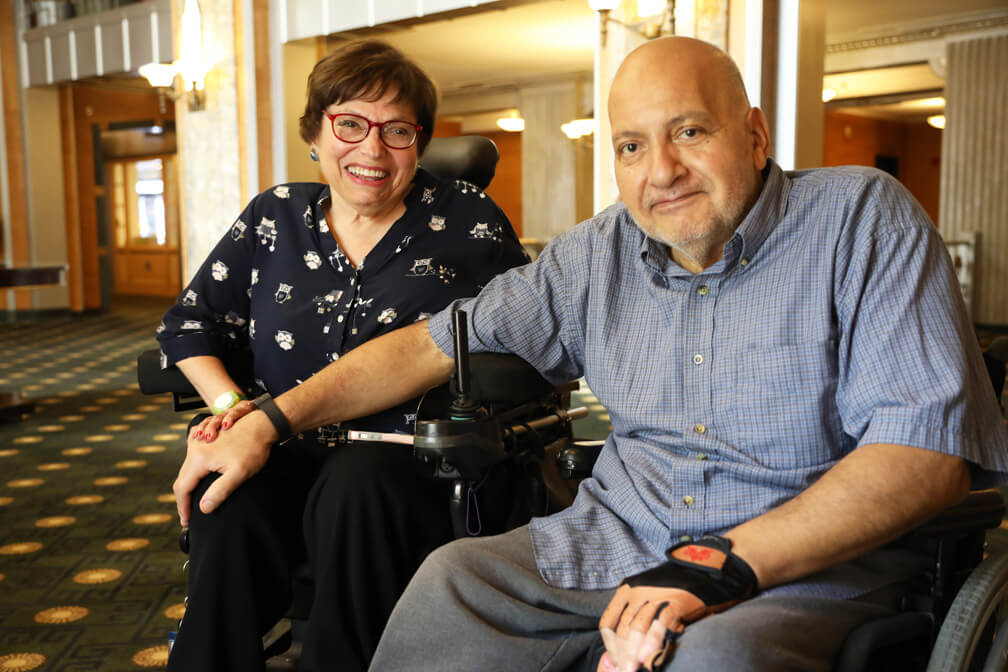As a child in 1949 living in Brooklyn, New York, Heumann contracted polio and began using a wheelchair for mobility. At the age of five, she was deemed a “fire hazard,” and denied entry to school, according to her website. As a child, her mother advocated for her and she was eventually allowed into school. Though this was among the first discriminatory acts against her, it was not the last.
“Some people say that what I did changed the world, but really, I simply refused to accept what I was told about who I could be. And I was willing to make a fuss about it.”
“It was still a radical claim that disabled people didn’t see themselves, or their conditions, as something to be pitied. Or that they insisted what most held them back wasn’t their health condition but society’s exclusion — maybe attitudes that they were less capable to do a job, go to college or find romance; or a physical barrier, like a sidewalk without a curb cut,” said NPR’s Joseph Shapiro in an article about Heumann.
Shapiro shared that he wrote an article about disability rights in 1987 in which Heumann said “Disability only becomes a tragedy when society fails to provide the things we need to lead our lives — job opportunities or barrier-free buildings, for example,” she said. “It is not a tragedy to me that I’m living in a wheelchair.” The article was not published because the idea she relayed seemed so “unexpected and strange.”
Starting a Revolution
In 1970, after Heumann passed her oral and written teaching exams, but she ultimately failed the medical exam where she was again deemed a “fire hazard.” This time, examiners said she would not be able to evacuate children or herself during an emergency. Heumann sued the board of education to allow her to become a teacher. The New York Times headline read “Woman in Wheel Chair Sues to Become Teacher” and the article noted she would be the city’s first teacher in a wheelchair. Her lawyers said the case was the first such civil rights suit ever filed in a federal court.
She was instrumental in the development and passage of Section 504, the Individuals with Disabilities Education Act, the Americans with Disabilities Act, the Rehabilitation Act, and the UN Convention on the Rights of Persons with Disabilities, which “have been advancing the inclusion of disabled people in the US and around the world and fighting to end discrimination against all those with disabilities.”
“Section 504 became a model for the ADA, which would extend the principles of non-discrimination to all public accommodations, employment, transportation, communications and access to state and local government programs,” NPR said. That means if you’ve ever used an elevator in a subway station or busy public area, if you used the curb cuts to more easily get on a sidewalk, or if you’ve used the accessible restrooms in a public space, you’ve benefited from the ADA. Closed captions, transcripts, and website accessibility, are all other examples of services for disabled people that benefit everyone.
When Richard Nixon vetoed the 1972 Rehabilitation act, Heumann helped lead a protest that shut down traffic in Manhattan. She also launched a 26-day sit-in at a federal building in San Francisco to get Section 504 of the revived Rehabilitation Act enforced. “(The sit-in) has often been described as the longest nonviolent occupation of a federal building in American history,” The New York Times reported.
More Advocacy Efforts
Heumann never stopped at securing rights for herself, but continued her work for others. Heumann co-founded the World Institute on Disability (WID), which was among the first global disability rights organizations led by people with disabilities. The institute is “dedicated to designing, building, and supporting whole community solutions by removing barriers to include people with disabilities.”
Heumann served the Clinton Administration as the Assistant Secretary for the Office of Special Education and Rehabilitative Services in the Department of Education from 1993 to 2001. From 2002 to 2006, she was the World Bank’s first Adviser on Disability and Development.
She was appointed by President Barack Obama as the first Special Advisor for International Disability Rights in the U.S. Department of State, a position she held from 2010-2017. She also was the Director for the Department on Disability Services and responsible for the Developmental Disability Administration and the Rehabilitation Services Administration.
The American Civil Liberties Union said she traveled to countries on every continent to help change the way people perceive those with disabilities and to help remove barriers they face in their everyday lives. Between 2000 and 2015, 181 countries passed disability civil rights modeled after the ADA, according to NPR.
Documentary and Book Release
Just before the pandemic, Heumann was featured in a documentary released at the 2020 Sundance film festival. “Crip Camp: A Disability Revolution,” was about Heumann and others who attended a summer camp (Camp Janed) for children with disabilities in the Catskills. Heumann later was a counselor at the camp. Camp Janed became “the beginnings of a revolution.”
“What I want is for the book and the film — and other books and films — to allow people to recognize the real absence of representation of disability in media, broadly speaking”
Heumann also has a memoir, “Being Heumann: An Unrepentant Memoir of a Disability Rights Activist.” Heumann told The Cut, “What I want is for the book and the film — and other books and films — to allow people to recognize the real absence of representation of disability in media, broadly speaking. Black disabled people, Latino disabled people, Asian disabled people, indigenous disabled people, disabled people with visible and invisible disabilities — they’re pretty absent. And yet, in the United States, it’s more than 20 percent of our population. Disability is something that all families experience, temporarily or permanently.”
“Some people say that what I did changed the world,” she wrote, “But really, I simply refused to accept what I was told about who I could be. And I was willing to make a fuss about it.”
Learn more about Judy Heumann on her website.
Photos courtesy of Judithheumann.com







